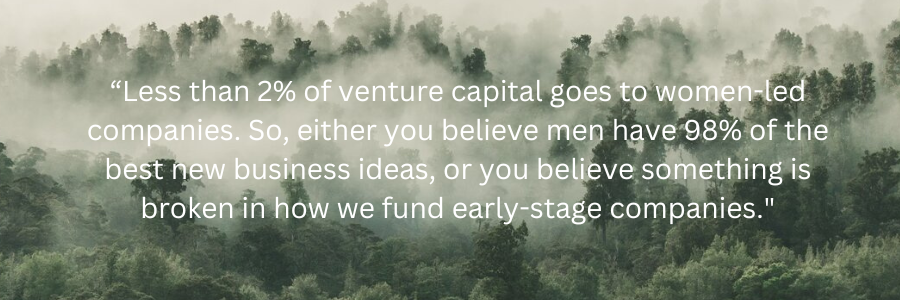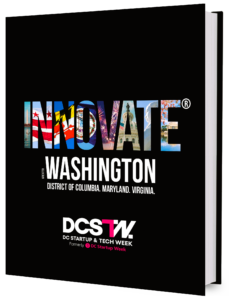DAINTREE CAPITAL – Investing In A Diverse Future
Daintree Capital emerges in the Washington, D.C., landscape not just as an investment firm but as a beacon of innovation and diversity. Founded by Alisha Griffey, a visionary with deep roots in the startup ecosystem, Daintree Capital’s mission resonates with the rich diversity of its namesake, the ancient Daintree Rainforest in Australia. Alisha shares: “Rainforests thrive because of their diversity, not despite it. Its diversity is the very reason for its resilience and longevity. That’s the philosophy at the core of our investment strategy.”
A Vision Born from Experience
Alisha’s journey to founding Daintree Capital was fueled by her first-hand experiences in the startup world, where she observed a glaring gap in funding and representation. “I spent a decade in the startup world where I saw first-hand the noticeable lack of diversity in who gets funded. I was often the only woman in executive team or board meetings, and people of color were almost entirely absent.” After researching the topic, Alisha was horrified to realize the extent of the issue: In the U.S., less than 2% of venture capital goes to women-led companies; it’s a mere 0.5% for black women.
She recounts her lightbulb moment: Since less than 2% of venture capital goes to women-led companies, I realised you either believe men have 98% of the best new business ideas, or you believe something is broken in how we fund early-stage companies. It wasn’t hard to figure out which one I believed to be true.” This disparity made her see the overlooked potential in women entrepreneurs, and she shortly later moved from being an operator to becoming an investor so she could focus full-time on rectifying this imbalance. Her resolve to bridge this gap led to the inception of Daintree Capital. Since its founding, Daintree has made over 100 loans to underrepresented founders. With a less than 1% default rate, Daintree is also making money for investors, proving that investing in these companies pays off. “I’m excited, but not surprised, that we’ve generated returns for investors while having a big impact on the companies we fund. There’s a lot of work left to be done given the massive imbalance in the flow of funds to under-represented founders. I hope our results will encourage other investors to jump in,” she adds.
Redefining Investment Strategies
Daintree’s investment approach is innovative. Traditionally, early-stage companies rely on equity investments from angel investors or venture capital firms, which often expect a tenfold return in a short period. However, this rapid growth expectation doesn’t suit all companies. Daintree invests via working capital loans as they enable investment in a broader range of business models and growth rates. It also can be a founder-friendly growth model as it allows business owners to retain ownership. Daintree invests in companies with strong unit economics that are growing, but perhaps not at the hyper rates often demanded by Silicon Valley investors.
Daintree also offers smaller check sizes, enabling it to support early-stage companies often overlooked by larger investors. Alisha notes: “Our check size is $10K-$75K, which is smaller than most investors, but we saw the need for smaller and more frequent influxes of capital to help these companies grow. Our focus on debt funding allows founders to retain more control and grow at a pace that’s right for their business.” This approach is not only more inclusive but also aligns with Daintree’s commitment to fostering long-term, sustainable growth in diverse business ecosystems.
Alisha asserts: “Daintree has provided over $4 million in growth capital through small checks that have big impact. The most gratifying achievement is that these investments have led companies to double their revenues within the first year of receiving the loans. To me, that shows it’s working”
Embracing Diversity in Action
Alisha points out that venture capital’s failure to invest in women and people of color is particularly shocking given that strong data shows companies led by diverse teams tend to grow revenue and achieve profitability faster than companies that lack gender and/or racial diversity in their executive teams.
“Investing in diverse founders isn’t just a moral imperative; it’s a strategic advantage,” says Alisha. The firm actively seeks out and supports founding teams from varied backgrounds, focusing on women and people of color. This dedication to diversity is not just about righting historical imbalances; it’s about tapping into a wellspring of creativity, innovation, and resilience that has been overlooked for decades.

Impact Beyond Investment
Daintree has also embraced an innovative approach to fundraising. Rather than raise a traditional investment fund, it’s built an impact fund on a non profit platform, allowing individuals to invest using philanthropic dollars. Alisha elaborates: “Once I learned there was $234B sitting unallocated in donor-advised funds (DAFs), I realized there was a huge opportunity to expand our impact by offering an investment alternative for money already ear-marked for charitable contributions, but currently sitting in money markets or other traditional investments within DAFs.” This unique fundraising approach gives Daintree access to patient, low-cost capital that it uses to fund small business loans. This approach allows it to focus on specific market segments where it sees the most impact, but are often overlooked because the check size is too small for traditional investors.
Daintree’s innovative impact fund provides donors a tax-efficient way to invest in diverse businesses. It’s a double-impact strategy: investors can grow their charitable funds through interest-earning investments while working to close the gender and racial wealth gap by investing in businesses run by women and people of color. She adds: “Most people don’t realize you can invest in for-profit companies from your DAF. But that’s simply because the big DAF platforms would rather you keep your money in their investment funds.”
A Model for the Future
Under Alisha’s leadership, Daintree Capital is an example of what innovation looks like within the financial sector. Daintree is paving the way for a more equitable future. She comments: “The one benefit of the statistics for investment in women-led companies being so abysmal is that it makes it painfully obvious that small changes won’t be enough; it’s time for wholesale reinvention of how we fund small businesses.”
She comments: “The one benefit of the statistics for investment in women-led companies being so abysmal is that it makes it painfully obvious that small changes won’t be enough; it’s time for wholesale reinvention of how we fund small businesses. She adds: “I hope to work myself out of a job one day. Once half the CEOs in America are women, I plan to retire.”














